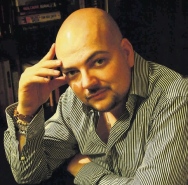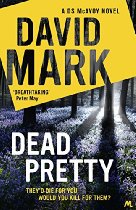Yorkshire writer DAVID MARK takes exception to the view that terrible crimes are the preserve of the big city. His years as a journalist opened his eyes to the fact that murder does not have a postcode.

I spend a lot of time telling people that there is life outside of London. This is the first time I’ve felt compelled to point out that there’s quite a lot of death too.
This isn’t another piece about why I set the books in Hull. My answer to that has been fairly well documented and can be boiled down thusly: I want to.
No, this piece is something of a rebuttal to the people who find it hard to suspend their disbelief long enough to accept the brutality which fills much Northern Noir.
“Beheadings? Flayings? Dismemberment with a Mastercard? In Yorkshire? Crime kingpins and sadists nailing people’s feet to their faces? No, that’s too hard to swallow. Now, I could picture it in Southwell, maybe ….”
My books’ main protagonist is Aector McAvoy: a Detective Sergeant on the Serious and Organised Unit within Humberside Police. In his latest outing, Dead Pretty, he is hunting whoever crushed a young woman’s throat between a toilet seat and the porcelain rim. He seeks out the connections that link the victim to another missing girl, and soon finds himself beginning to suspect a vigilante killer is at large in the area.
Impossible to imagine? Too far-fetched? Sadly not. I’ve sat through inquests and court hearings where injuries a hundred times more brutal were inflicted upon the victim. It wouldn’t be pushing it to say that for every ingenious crime dreamed up by a fiction writer, real people are out there doing real things that are so many times worse.
I try to infuse my books with realism and authenticity without revelling in any of the gore. But gore is a part of the reality of crime. Murder is grotesque. The ending of a life is a brutal, terrible thing. And the idea that it could only go on in the capital is a nonsense.
I can’t say it’s happened a lot, but I’ve had more than my fair share of Tweets, emails and Amazon reviews in which the reader has delighted in telling me that while they enjoyed my books, they struggled to imagine such terrible things taking place outside of the big city.
Where do I even begin? Does anybody remember the Yorkshire Ripper? Bearded fellow. Had a few women issues? Created a wave of terror throughout the North as he took his own sick pleasures, with relative impunity, for years? Was that an aberration? I’m afraid not. I’ve covered so many murder trials as a reporter that sometimes my head reels at just how often lives are torn to ribbons by brutal violence.
Perhaps the detractors are suggesting that London has some kind of magnetic attraction, slowly dragging psychopaths from the shires to a more suitable location for their trade? Is there some form of grisly gravity exerting pressure on the kind of people who have sexual fantasies about newsreaders and like to stab pictures of chinchillas while dressed in waders and a bra?
It feels odd having to make the case, and I don’t say it with any degree of pride, but horrible, terrible, evil things happen in tiny hamlets and villages too. If murder was just the preserve of the metropolis, Miss Marple would have had nothing to do but await the invention of Sudoku and remember her days a Paris burlesque dancer (I like to invent a back story).
Now, I was a journalist for a long time. I’ve stood on people’s doorsteps scribbling frantically onto soggy notepads while the scene of crime officers are busy wheeling away the body from next door. I’ve looked into wide, tear-streaked eyes and asked the searing questions expected of local journalists, like “did it come as a shock when your neighbour bludgeoned his wife with a toaster and then tried to gas himself in the electric oven”? The answer is nearly always the same.
“It’s really shocking. That kind of thing doesn’t happen around here. You imagine it in the big city but not here. He was always such a lovely chap. He’d do anything for anybody. And what a hard worker. I used to see him out there at all hours, digging away in his garden ….”
I always looked forward to the day that somebody answered my questions with something out of the ordinary. “Was I shocked? Hell no. ‘Stabber Harris’? Man’s a nutter. Bloody relief the police have got him. The kids have been living under the stairs since he moved in.”
The truth of it is, London does not have the monopoly on the macabre. When I started writing the McAvoy books I did briefly toy with the idea of setting the novels in some down-at-heel London borough. I was drawn by the multi-culturalism and the history and liked the idea of describing the city’s tones and its architecture and the way the light sometimes makes the Thames shine like polished teak. But I ended up bringing McAvoy to Hull. I wanted him to live in the community that he policed. I wanted him to feel that his own community was under threat every time somebody took a life. And I knew from personal experience that even the goriest of crimes would not seem out of place in an area with a high crime rate, high unemployment and a cityscape still carrying the scars of war and economic decline.
 I’m not sure I’ve made a particularly life-affirming point. But if there’s one thing I know from my years as a reporter, it’s that you’re never truly safe. Best stay indoors, really. Read a good book. There’s one out now that you just might like.
I’m not sure I’ve made a particularly life-affirming point. But if there’s one thing I know from my years as a reporter, it’s that you’re never truly safe. Best stay indoors, really. Read a good book. There’s one out now that you just might like.
Dead Pretty, £12.99 Hbk Mulholland January 28, 2016
BUY IT HERE